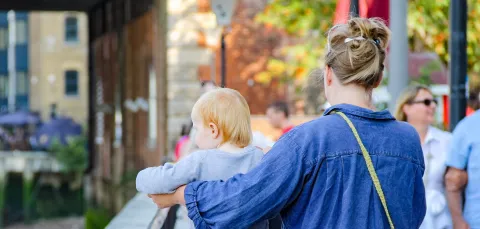The sandwich generation are those who support both older and younger generations. As our population ages, it is increasingly common for adults in mid-life to be supporting older children and grandchildren, while also providing informal care for older family and friends.
These dual-carers often provide informal care for others as well as carrying out paid employment. The Covid-19 pandemic has intensified the responsibilities of these individuals, and brought new challenges for those ‘in the middle’.
Around 7 million (or one in ten) people in the UK are informal carers, according to the Carers Trust. Researchers in the Centre for Research on Ageing and the ESRC Centre for Population Change Connecting Generations have been examining the pressures on carers and more specifically the ‘sandwich generation’, finding that, even before Covid-19 they faced emotional and financial pressures, and diminishing social interactions. This has been made worse by the pandemic, with the Carers Trust stating that “coronavirus has significantly exacerbated burnout among unpaid carers.”
An April 2020 a Carers UK survey into the experiences of over 5,000 current and former unpaid carers found that “the coronavirus crisis is having a profound impact on carers’ lives. Many of those who responded were providing very high levels of care, or juggling care in complex lives.” A follow-up report in October 2020 found that 4 in 5 unpaid carers were providing more care than before the pandemic, with more than half of carers seeing their physical health impacted by caring through the pandemic, and 64% saying their mental health has worsened.
With this upsurge in pressure on carers, researchers are working to unpick the impact of coronavirus on carers, one area they are investigating is how living arrangements have changed due to pandemic lockdowns. Where people were only providing occasional care and support before the pandemic, they may have been unexpectedly placed in a situation where they are living, albeit temporarily, with those they care for. Or it may be more difficult to provide care due to lockdown restrictions and having to live apart with very little contact to protect those who are vulnerable and shielding.
The findings show that younger people were more likely than older people to have changed their living arrangements – this has usually meant moving back in with their parents. These households were more likely to report higher levels of stress. This in turn has important implications for public health and wider policy as prolonged periods of stress can lead to serious health problems. The research, led by Athina Vlachantoni, Professor of Gerontology and Social Policy, Professor Maria Evandrou, Director of the Centre for Research on Ageing and Professor Jane Falkingham, Director of the Centre for Population Change and Connecting Generations, has found that the sandwich generation faces emotional and financial pressures, and diminishing social interactions.
Our early findings indicate that around one third of those in mid-life are ‘at risk’ of having to provide care to multiple generations of their families, and about half have to provide some care to both grandchildren and elderly parents at the same time. Figuring out ways to support individuals who care for multiple generations needs to be a policy priority. For example, facilitating ways for mid-life people to respond to family support demands while maintaining paid employment, will be critical in fostering future intergenerational support.
Athina Vlachantoni - Professor of Gerontology and Social Policy
Professor Evandrou comments: “At first sight, the changes in living arrangements caused by the Covid-19 pandemic could be seen as positive, as returning young adults benefit from the resources of the parental home, and older parents receive support from younger household members.
An unexpected move, however, can also cause stress. For example, young people could feel they have lost their independence. Those in mid-life could struggle with having their grown-up children and even grandchildren living at home again, whilst potentially also having to provide care to older family members. Within a household, members provide and receive emotional, instrumental and financial support. Stress and conflict, however, can flare up when people believe that resources and demands for support are not equal. This stress can then lead to longer term health risks.”








